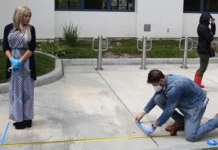Our Brothers and Sisters in Nigeria Need Us
Team, we must sound the alarm on the atrocities currently taking place in Nigeria against followers of Christ. In a statement by the Chairman Denominational Heads Plateau and Christian Association of Nigeria (CAN) Plateau State, a renewed attack on Christians has left over 6,000 – mainly women, children, and elderly – maimed or dead in raids by armed Muslim Fulani herdsman in the Middle Belt of the country.
Mainstream media/news outlets have given sparse coverage of the bloodshed; we ask that you prayerfully educate yourself on these events – watch the video interview above with Human rights lawyer, Emmanuel Ogebe, and CBN’s Nigerian director, Felix Oisamoje.
For further context, read a portion of the transcript from BreakPoint: “Pure Genocide” in Nigeria.
Get involved, support organizations on the front line, and war in the Spirit through prayer for Team Jesus everywhere!
——-
Nigeria, by most estimates, is almost evenly divided between Muslims and Christians. That religious split largely follows geographic lines: The northern part of the country is predominantly Muslim, the eastern and southern parts of the country heavily Christian. The middle, sometimes called the “Middle Belt,” is ethnically and religiously diverse.
Not surprisingly, what makes Nigeria so dangerous for Christians originates in the Islamic north. There, Christians have been on the receiving end of a campaign Open Doors calls “religious cleansing,” that is, an attempt “to eradicate Christianity” from the region.
One of the most notorious Islamist terrorist groups in the world, Boko Haram, is responsible for killing thousands of Christians and displacing countless more in northern Nigeria. But Boko Haram isn’t the only group targeting Christians there.
In a statement released in late June, Christian leaders claimed that “over 6,000 persons—mostly children, women and the aged—have been maimed and killed in night raids by armed Fulani herdsmen.”
The Fulani are an ethnic group who are overwhelmingly Muslim, and their raids are not always at night. In April, Fulani herdsman attacked a group of Christians during Sunday mass, killing two priests and seventeen parishioners. The same attackers then razed fifty homes belonging to Christians. In fact, earlier in the year, on New Year’s Day, 72 people died at the hands of a Fulani attack.
In their statement, Nigerian Christian leaders also complained about the “continuous abduction of under-aged Christian girls by Muslim youths…” These girls “are forcefully converted to Islam and taken in for marriage without the consent of their parents.”
The language used by Christian leaders in Nigeria in their statement to describe what is happening, “pure genocide,” is hard to disagree with. As was the call, directed toward the national government to “stop this senseless … blood shedding… and avoid a state of complete anarchy where the people are forced to defend themselves.”
Unfortunately, Nigerian officials are downplaying, if not outright denying, the religious dimension of what’s happening. Instead, they’re calling this a conflict over resources, in this case, over land.
Don’t believe it. For starters, the security forces are, in the words of the statement, “skewed to one religion and one region of the country,” that is, Islam and the Islamic north.
What’s more, this idea conveniently glosses over the one-sided nature of the violence in the region: The Fulani are the hammer and the Christians are the nails.
Finally, any student of the history of genocide or ethnic cleansing knows that conflicts over resources are often just the trigger that unleashes the sort of mass violence we’re currently seeing in the nation of Nigeria.
So, what can we do about this? First, we must pray, continually, for our brothers and sisters there. Second, we have to encourage the White House to continue pressing Nigeria about what’s happening in its Middle Belt, as it did during an April meeting with the Nigerian president.
President Trump called what’s happening then a “serious problem.” That’s an understatement. It’s past time to make sure that the response to the problem is equally as serious and not understated at all.
——-











